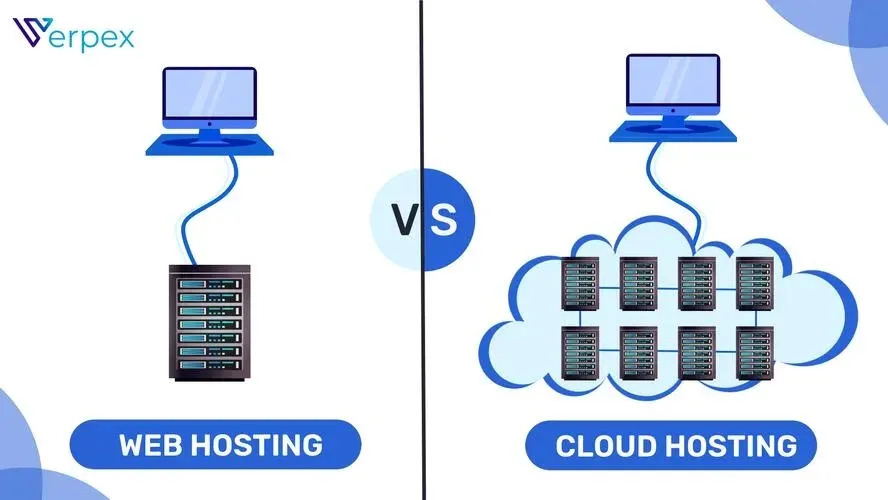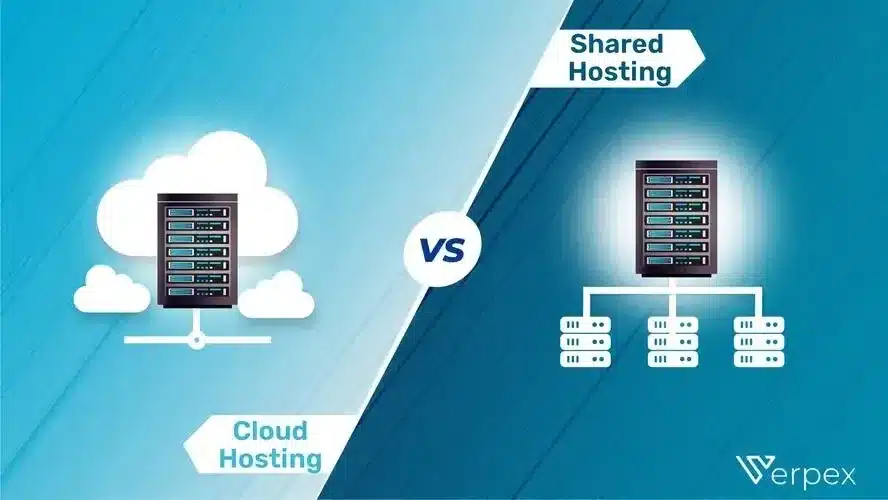Cloud hosting and shared hosting are popular web hosting choices. Each offers unique benefits for website management.
Understanding these differences helps in picking the right fit for your needs. Choosing between cloud and shared hosting involves understanding their strengths and limitations. Cloud hosting provides scalable resources and high uptime, perfect for growing businesses. Shared hosting offers affordability and simplicity, suitable for personal websites or small businesses.
Comparing these options aids in making informed decisions. With Hostwinds, you can explore various hosting solutions designed for different needs. Whether you prioritize control or cost-effectiveness, Hostwinds offers reliable services. Their range includes shared, VPS, and cloud hosting, ensuring flexibility and robust support. Make the best choice by evaluating your website's requirements against these hosting types.
Introduction To Hosting Options
Choosing the right web hosting service is crucial for your website's performance and growth. With so many options available, it can be challenging to know which one is best for you. In this section, we will explore two popular hosting options: Cloud Hosting and Shared Hosting. Understanding the differences will help you make an informed decision.
Understanding Cloud Hosting
Cloud Hosting uses a network of virtual servers to host your website. Instead of relying on a single physical server, your site uses the resources of multiple servers. This provides greater flexibility and scalability.
- Scalability: Easily scale resources up or down based on your needs.
- Reliability: Higher uptime and redundancy since multiple servers are involved.
- Performance: Fast loading times due to resource distribution.
With cloud hosting, you pay for what you use, making it cost-effective for growing websites.
Defining Shared Hosting
Shared Hosting means your website shares a physical server with other websites. This is a cost-effective option for small to medium-sized websites.
- Affordability: Lower costs compared to other hosting types.
- Simplicity: Easy to set up and manage, especially for beginners.
- Resources: Shared resources among multiple users, which can impact performance.
Shared hosting is ideal for personal blogs, small business websites, and portfolios.
Why Choosing The Right Hosting Matters
The right hosting choice impacts your website's speed, uptime, and overall user experience. Here’s why:
| Factor | Cloud Hosting | Shared Hosting |
|---|---|---|
| Performance | High, due to multiple servers | Moderate, shared resources |
| Scalability | Easily scalable | Limited |
| Cost | Pay as you go | Lower initial costs |
| Uptime | 99.9999% uptime with redundancy | Variable, dependent on server load |
| Management | Requires some technical knowledge | Beginner-friendly |
Whether you choose Hostwinds’ Cloud Servers or Shared Hosting, understanding your website’s needs will help you choose the right plan.
Visit Hostwinds to explore their hosting solutions, designed for both personal and business use.
Key Features Of Cloud Hosting
Cloud hosting offers several unique features that make it an ideal choice for various hosting needs. Below are the key features that highlight the advantages of cloud hosting.
Scalability And Flexibility
Cloud hosting provides scalability like no other. You can easily upgrade or downgrade resources based on your needs. This flexibility ensures your website can handle traffic spikes without performance issues.
| Feature | Details |
|---|---|
| Resource Allocation | Dynamic adjustment of CPU, RAM, and storage. |
| Traffic Management | Efficient handling of sudden traffic increases. |
Performance And Speed
Cloud hosting offers excellent performance and speed. Multiple servers work together to ensure quick load times. Hostwinds cloud servers are designed for optimal speed and performance.
- Fast loading times
- Optimized resource usage
- Quick data processing
Reliability And Uptime
Reliability is a cornerstone of cloud hosting. Hostwinds promises a 99.9999% uptime with 2N redundancy standards. This ensures your website stays online and accessible.
- High redundancy standards
- Consistent uptime guarantees
- Reliable server infrastructure
Security Measures
Security is paramount in cloud hosting. Hostwinds implements robust security measures to protect your data. These include advanced firewalls, regular backups, and secure data centers.
Security Features:
- Advanced firewalls
- Regular data backups
- Secure data centers
- Continuous monitoring
Hostwinds cloud hosting ensures your website is secure, fast, and reliable, making it an excellent choice for both personal and business use.
Key Features Of Shared Hosting
Shared hosting offers affordability, making it ideal for beginners. Users share server resources, which can limit performance during high traffic periods. Suitable for small websites or blogs, it provides basic features and easy management.
Shared hosting is a popular choice for many website owners. It's often the first step for individuals and small businesses entering the online world. Below are the key features that make shared hosting an attractive option.
Affordability And Cost-effectiveness
Shared hosting stands out due to its affordability. Hosting providers like Hostwinds offer low-cost plans suitable for personal and business websites. This makes it a cost-effective solution for those with limited budgets.
Here's a breakdown of the typical costs involved:
| Hosting Plan | Average Monthly Cost |
|---|---|
| Basic Shared Hosting | $3 – $10 |
| Business Hosting | $10 – $20 |
Ease Of Setup And Management
Shared hosting offers ease of setup and management. Providers like Hostwinds ensure that users can start quickly without technical expertise. Hosting control panels, like cPanel, make website management simple.
- One-click installations for CMS like WordPress
- Easy-to-use control panels
- Automated updates and backups
Performance Limitations
While shared hosting is economical, it has performance limitations. Resources like CPU, RAM, and bandwidth are shared among multiple users. This can lead to slower speeds during peak times.
Key performance aspects to consider:
- Limited bandwidth
- Shared server resources
- Potential for slower load times
Security Considerations
Security in shared hosting is managed by the provider. Hostwinds ensures basic security measures are in place, but shared environments can pose risks.
Important security features include:
- Regular security updates
- Basic DDoS protection
- Firewall setups
For enhanced security, users might need additional measures.

Credit: verpex.com
Pricing And Affordability Breakdown
Understanding the pricing and affordability of hosting solutions is crucial for any website owner. In this section, we will break down the costs associated with cloud and shared hosting. We will also examine which option provides the best value for your money.
Cost Analysis Of Cloud Hosting
Cloud hosting, offered by providers like Hostwinds, generally comes with flexible pricing. This means you pay based on your usage and the resources you consume.
Here are the typical costs associated with cloud hosting:
- Initial Setup Fee: Often minimal or none
- Monthly Costs: Vary depending on resource usage
- Scalability: Easily scalable with costs adjusted accordingly
Cloud hosting can be cost-effective for businesses with fluctuating traffic, as you only pay for what you use.
Cost Analysis Of Shared Hosting
Shared hosting is known for being budget-friendly. It is an ideal choice for personal or small business websites. Hostwinds offers affordable shared hosting plans with consistent pricing.
Typical costs involved in shared hosting include:
- Initial Setup Fee: Generally low or waived
- Monthly Costs: Fixed and lower than cloud hosting
- Resource Allocation: Limited and shared with other users
Shared hosting is best suited for websites with predictable and lower traffic volumes.
Value For Money: Cloud Vs Shared Hosting
When comparing the value for money between cloud and shared hosting, it is important to consider your specific needs.
| Hosting Type | Cost | Features | Best For |
|---|---|---|---|
| Cloud Hosting | Flexible pricing based on usage | Scalable resources, high uptime | Businesses with variable traffic |
| Shared Hosting | Fixed and lower monthly costs | Basic resources, shared environment | Personal and small business websites |
Hostwinds provides a range of both cloud and shared hosting options, ensuring there is a suitable plan for every need. Contact Hostwinds directly for detailed pricing information.
Pros And Cons Based On Real-world Usage
Choosing between cloud hosting and shared hosting can be challenging. Understanding the pros and cons based on real-world usage helps make an informed decision.
Pros Of Cloud Hosting
Cloud hosting offers many advantages. Here are the key benefits:
- Scalability: Adjust resources based on demand, ensuring optimal performance.
- Reliability: 99.9999% uptime promise with redundancy standards.
- Customization: Customizable cloud servers with various 1-click installation options.
- Support: 24/7/365 award-winning customer support.
Cons Of Cloud Hosting
Despite its advantages, cloud hosting has some drawbacks:
- Cost: Generally more expensive than shared hosting.
- Complexity: Requires more technical knowledge to manage.
- Resource Management: Over-provisioning can lead to unnecessary expenses.
Pros Of Shared Hosting
Shared hosting is a popular choice for many. Here are its main benefits:
- Affordability: Cost-effective solution for personal or small business websites.
- Ease of Use: Simple setup and management.
- Support: Hostwinds offers 24/7 customer support for shared hosting users.
Cons Of Shared Hosting
Shared hosting also has some disadvantages:
- Limited Resources: Shared resources can lead to slower performance.
- Security: Less isolation from other users can increase security risks.
- Scalability: Not ideal for websites with high traffic or resource needs.
For more details on Hostwinds hosting solutions, visit their website.

Credit: www.wix.com
Ideal Users And Scenarios
Choosing between Cloud Hosting and Shared Hosting depends on your specific needs and scenarios. Both options cater to different user profiles and usage cases. Below, we will explore who should choose cloud hosting, who should opt for shared hosting, and compare their use cases.
Who Should Choose Cloud Hosting?
Cloud hosting is ideal for users who need scalability and flexibility. This hosting option is suitable for:
- Growing businesses that need to handle increasing traffic and data.
- E-commerce websites requiring high availability and reliability.
- Developers needing a customizable environment for testing and deployment.
- Startups with fluctuating demands and need for resource scalability.
Hostwinds offers customizable cloud servers with various 1-click installation options, ensuring users get the flexibility they need.
Who Should Opt For Shared Hosting?
Shared hosting is a great choice for users who need affordable and simple hosting solutions. This type of hosting is best for:
- Personal websites or blogs that do not require high resources.
- Small businesses with limited budgets.
- Beginners who are just starting with website development.
- Static websites with low traffic volumes.
Hostwinds' shared hosting is known for being affordable and reliable, making it perfect for these scenarios.
Comparing Use Cases: Cloud Vs Shared Hosting
| Use Case | Cloud Hosting | Shared Hosting |
|---|---|---|
| Scalability | High scalability, suitable for growing websites. | Limited scalability, best for small websites. |
| Customization | Offers a high level of customization. | Limited customization options. |
| Performance | High performance with dedicated resources. | Shared resources may affect performance. |
| Cost | Higher cost due to advanced features. | More budget-friendly, suitable for small sites. |
Hostwinds provides both hosting types, ensuring you have the right solution for your needs. For more details, visit their website.
Conclusion: Making The Right Choice
Choosing between Cloud Hosting and Shared Hosting can be challenging. Each has its own strengths and is suitable for different needs. Below, we summarize the key differences, provide final recommendations based on needs, and explore future trends in hosting.
Summarizing Key Differences
| Feature | Cloud Hosting | Shared Hosting |
|---|---|---|
| Scalability | Highly scalable, can handle traffic spikes. | Limited scalability, suitable for smaller websites. |
| Performance | High performance, resources are dedicated. | Performance may vary, shared resources. |
| Cost | Typically higher cost, but flexible pricing. | Affordable, fixed pricing. |
| Security | Enhanced security, isolated environment. | Basic security, shared environment. |
| Customization | Highly customizable with various options. | Limited customization, standard features. |
Final Recommendations Based On Needs
Consider the following recommendations to help make the right choice:
- Small Websites or Blogs: Shared Hosting is ideal due to its affordability and simplicity.
- Business Websites: Opt for Cloud Hosting for better performance and scalability.
- E-commerce Sites: Cloud Hosting offers the reliability and security needed.
- Growing Websites: Cloud Hosting is preferable due to its ability to handle increased traffic.
Future Trends In Hosting
The hosting industry is evolving rapidly. Here are some future trends to watch:
- Increased Use of AI: AI will enhance performance and security.
- Better Integration: Seamless integration with other services will become standard.
- Green Hosting: Eco-friendly hosting solutions will gain popularity.
- Enhanced Security: Security protocols will continue to improve.
For more information or to get started, visit the Hostwinds website.

Credit: www.cloudpanel.io
Frequently Asked Questions
Which Is Better Cloud Hosting Or Shared Hosting?
Cloud hosting offers better scalability and performance, while shared hosting is more budget-friendly. Choose based on your needs.
What Is The Difference Between Shared Server And Cloud Server?
A shared server hosts multiple websites on one physical server, sharing resources. A cloud server uses multiple virtual servers, offering scalability and flexibility.
What Is The Difference Between Cloud Hosting And Dedicated Hosting?
Cloud hosting uses multiple servers to distribute resources. Dedicated hosting uses a single physical server for one user. Cloud hosting is scalable and cost-effective. Dedicated hosting offers more control and performance.
What Is The Difference Between Hosting And Shared Hosting?
Hosting involves renting server space for your website. Shared hosting means multiple websites share the same server resources.
Conclusion
Choosing between cloud and shared hosting depends on your needs. Cloud hosting offers flexibility and scalability. Shared hosting is cost-effective and user-friendly. Both have their advantages and serve different purposes. For reliable and affordable hosting, consider Hostwinds. They provide both options with excellent support. Learn more about their services here.


